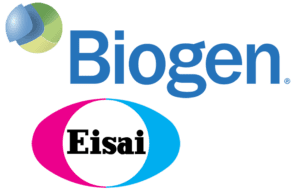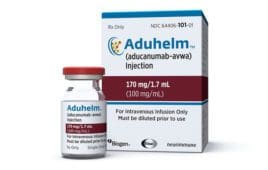 The FDA’s conditional approval of Biogen (NSDQ:BIIB) and Eisai’s (OTCMKTS:ESALY) Alzheimer’s drug aducanumab (Aduhelm) may have been controversial, but the decision will likely have a significant financial impact.
The FDA’s conditional approval of Biogen (NSDQ:BIIB) and Eisai’s (OTCMKTS:ESALY) Alzheimer’s drug aducanumab (Aduhelm) may have been controversial, but the decision will likely have a significant financial impact.
There are 6 million people with Alzheimer’s in the U.S. alone, according to Alzheimer’s Association estimates. Approximately half of those patients have mild symptoms, which is the group most likely to be prescribed the drug.
A significant number of physicians are considering prescribing the intravenous drug for approximately one-third of Alzheimer’s patients with mild cognitive impairment, according to an analysis from Jefferies.
The survey bodes well for the early uptake of the drug, according to Jefferies. But the continued success of aducanumab will require winning over skeptical neurologists and psychiatrists. Several physicians have penned op-ed’s voicing their resistance to the drug in outlets ranting from STAT to the Baltimore Sun. Last November, an external FDA advisory panel expressed opposition to the possibility of FDA approval of aducanumab, arguing that there were insufficient efficacy data to warrant approval. Three members of that panel recently resigned.
If doctors continue prescribing the drug in the long run, sales of aducanumab could reach peak sales of $10–15 billion, Jefferies predicts. However, UBS expects that peak sales of aducanumab will be at the lower end of that range.
That level of sales would likely make aducanumab a top 10 blockbuster. For context, the best-selling drug in 2020 was Humira, which brought in $19 billion for AbbVie. The next bestseller was Merck’s Keytruda, which generated $14 billion last year.
As part of the aducanumab treatment, patients will require preliminary PET scans to determine the initial levels of amyloid in the brain.
The need for such PET scans could drive an uptick in PET imaging, according to an investor briefing note from UBS.
As a result, Cardinal Health (NYSE:CAH) could be among the beneficiaries of the aducanumab approval as the company’s Nuclear & Precision Health Solutions division has a significant reach across the U.S. In addition, the company operates approximately one-third of the PET tracers now approved for the type of scan required for aducanumab treatment. By FY 2022, Cardinal Health could see a tangible lift from PET screening related to new aducanumab diagnoses, UBS predicts.
While aducanumab could have an annual price tag of $56,000, value-based pricing for the drug would be in the range of $2,500 to $8,300 per year, according to the nonprofit Institute for Clinical and Economic Review (ICER). The price tag was more than double than the $24,000 annual cost that UBS had predicted. But if ongoing data suggest aducanumab is not effective, more backlash against the high price tag is likely. “If the evidence is judged as suggesting no health benefit for aducanumab, then its value-based price would be $0,” ICER concluded.
Much of the revenue for the drug will likely initially come from Medicare.
The drug’s high price tag could drain taxpayers and contribute to rising insurance premiums, as The New York Times observed.
The drug also had significant side effects in clinical trials leading to brain swelling and amyloid-related imaging (ARIA) abnormalities in a considerable percentage of patients.
Filed Under: Neurological Disease





Tell Us What You Think!
You must be logged in to post a comment.